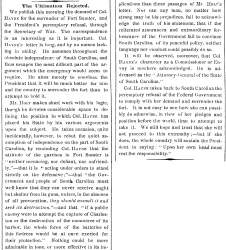Record Data
Transcription
The Ultimatum Rejected.
We publish this morning the demand of Col. HAYNE for the surrender of Fort Sumter, and the President’s peremptory refusal, through the Secretary of War. The correspondence is as interesting as it is important. Col. HAYNE’S letter is long, and by no means lacking in ability. He assumes throughout the absolute independence of South Carolina, and thus escapes the most difficult part of the argument which the emergency would seem to require. He aims merely to convince the President that it will be much better for him and the country to surrender the fort than to attempt to hold it.
Mr. HOLT makes short work with his logic, though he devotes considerable space to defining the position in which Col. HAYNE has placed his State by his various arguments upon the subject. He takes occasion, quite incidentally, however, to rebut the quiet assumption of independence on the part of South Carolina, by reminding Col. HAYNE that the attitude of the garrison in Fort Sumter is “neither menacing, nor defiant, nor unfriendly,” – that it is “acting under orders to stand strictly on the defensive;” – that “the Government and people of South Carolina must well know that they can never receive aught but shelter from its guns, unless, in the absence of all provocation, they should assault it and seek its destruction,” – and that “if a public enemy were to attempt the capture of Charleston or the destruction of the commerce of its harbor, the whole force of the batteries of this fortress would be at once exerted for their protection.” Nothing could be more admirable in tone, or more effective in its implications than these passages of Mr. HOLT’S letter. Nor can any man, no matter how strong may be his prejudices, fail to acknowledge the truth of his statement, that if the reiterated assurances and extraordinary forbearance of the Government fail to convince South Carolina of its peaceful policy, neither language nor conduct could possibly do so.
It will be observed, moreover, that Col. HAYNE’S character as a Commissioner or Envoy is nowhere acknowledged. He is addressed as the “Attorney-General of the State of South Carolina.”
Col. HAYNE takes back to South Carolina the peremptory refusal of the Federal Government to comply with her demand and surrender the fort. It is not easy to see how she can possibly do otherwise, in view of her pledges and position in the world, than to attempt to take it. We still hope and trust that she will not proceed to this extremity; - but if she does, the whole country will sustain the President in saying: “Upon her own head must rest the responsibility.”




